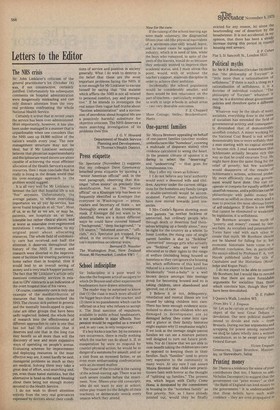Political myths
Sir: Mr B. P. Boreham (October 18) thinks that "the philosophy of Toryism" is "little more than a rationalisation of selfishness." If there is such a thing as a rationalisation of selfishness, it is a doctrine of individual conduct "The philosophy of Toryism" whatever it may be, is a doctrine about government policies and therefore quite a different thing.
Whatever may be the ideals of manY socialists, everything done in the name of socialism has extended the field of governmental activity and consequently diminished that of demonstrablY unselfish conduct. A miner working for the National Coal Board is not acting demonstrably less or more selfishly than a man starting with no capital striving to become rich. I read somewhere that Schliemann actually became rich this way so that he could excavate Troy. He might have done the same thing for the relief of poverty, but few socialists would disapprove of the results of Schliemann's actions, achieved probably more efficiently than any government would have done. One can cooperate or compete for equally selfish or unselfish reasons, and a politician can be philanthropic with public money for motives as selfish as those which lead a man to practise the most obvious forms of self-indulgence. If there is one thing that cannot be eliminated or weakened by legislation, it is selfishness.
Mr Boreham accepts the myth of "poverty and misery" caused by laissez-faire. As socialists and paternalistic Tories have vied with each other to create that myth, Mr Boreham should not be blamed for falling for it; but economic historians have come to a different conclusion. See, in particular the essays edited by Professor F. A. von Hayek published under the title of Capitalism and the Historians (Rout. ledge and Kegan Paul),
I do not expect to be able to convert Mr Boreham; but I would like to remind him that there are more formidable arguments for socialism than those which convince him, though they too have been demolished.
D. E. Folkes 5 Queen's Walk, London W5
From Mrs V. J. Em peon
Sir: Let us be certain at the outset of the object of the next Great Debate devolution. Our new political masters intend to divide and rule from Brussels. During our last arguments and scrapping for power among ourselves we shalj be taken wholly into a written constitution, so to be swept away into Federal Europe.
Vivien Empson Greenacres, Upper Bromlow, Minsterley, nr Shrewsbury, Salop
































 Previous page
Previous page